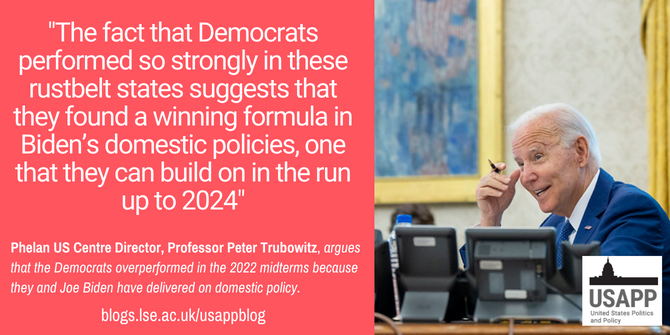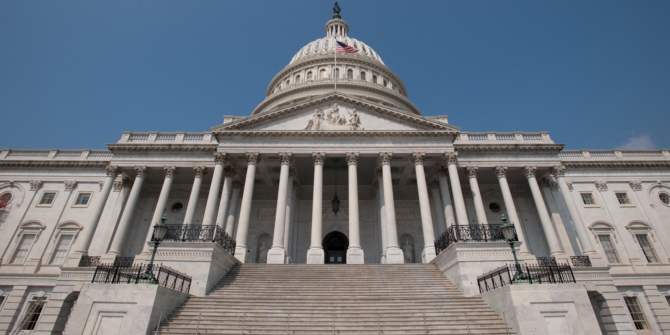 Following midterm elections that saw the Republican Party perform worse than had been generally expected, Phelan US Centre Director, Professor Peter Trubowitz discusses three key takeaways. He argues that despite what many commentators are saying, we should not be quick to view Donald Trump as a spent political force, that the Democrats did well in these elections because they have delivered on socio-economic issues, especially for blue-collar voters in key rustbelt states, and that for the most part, these midterm elections were a good result for democracy.
Following midterm elections that saw the Republican Party perform worse than had been generally expected, Phelan US Centre Director, Professor Peter Trubowitz discusses three key takeaways. He argues that despite what many commentators are saying, we should not be quick to view Donald Trump as a spent political force, that the Democrats did well in these elections because they have delivered on socio-economic issues, especially for blue-collar voters in key rustbelt states, and that for the most part, these midterm elections were a good result for democracy.
Trump is down but not out — yet
The mainstream media is filled with story after story about the end of Trump’s hold on the Republican Party. This should be taken with a large dose of salt. Trump has been counted out before, only to bounce back. In the wake of the January 6 attack on the Capital, we heard much the same. This was only to watch Republican lawmakers who rebuked Tump quickly and publicly fall back into line. We are told this time is different because Trump is now a “loser” — many of the candidates he backed and campaigned for lost or are losing in tight races. But Trump was also a loser in 2020. He was soundly defeated by Joe Biden — full stop.
The issue then, as now, is how will Trump’s hard core base respond? Will they jump to Florida Governor Ron DeSantis, who won big on Tuesday? Possibly, but DeSantis’s hesitation to quickly seize the moment and announce that he’s running for the Republican nomination suggests that he’s not rock-solid sure himself. The strong likelihood that in January a Republican Speaker of the House will be dealing with small margins means that Trump will have strong voice at the table via the many MAGA lawmakers (e.g., Rep. Jim Jordan of Ohio) who are tied to him at the hip. Meanwhile, Trump is going to get another opportunity to “redeem” himself in the Georgia run-off election on December 6. Should Herschel Walker, Trump’s hand-picked candidate win, a big if to be sure, Trump will claim victory and his many supporters in the party will see it that way, too
Alas, it’s still the economy, stupid
Why didn’t the Republicans do better? Many point to Donald Trump’s polarizing influence and the Supreme Court’s ruling in June overturning Roe v Wade. I’ve stressed both critical points myself over the past couple of days in interviews and panel discussions. However, in my view, the emerging mainstream narrative is ignoring or downplaying another key reason that so many Democrats held on to their seats or won open-seat contests. In short, Biden and the Democrats delivered. Joe Biden ran in 2020 on an unabashedly New Deal-style platform promising to begin restoring America’s fraying socio-economic fabric. And despite razor thin margins in the House and Senate, the Democrats managed to push through a remarkable amount of legislation that included long-term investments in infrastructure, technology, health care, and climate to a tune of about $1.5 trillion (to say nothing of the $1.9 trillion in short-term COVID-19 stimulus spending he secured).

“P20220829ES-0511” by The White House is United States Government Work
If you don’t think this mattered, consider what just unfolded in Michigan, Pennsylvania, and Wisconsin. These are the so-called blue wall states that Donald Trump won in 2016 by appealing to blue-collar voter anxieties about their declining material fortunes due to globalization and the erosion of social protections under Democratic as well as Republican administrations. On Tuesday, Democrats won up and down the ballot in these states; the lone exception was Republican Ron Johnson’s close re-election in Wisconsin. While we will need to await detailed analysis of the results, the fact that Democrats performed so strongly in these rustbelt states suggests that they found a winning formula in Biden’s domestic policies, one that they can build on in the run up to 2024.
Democracy has a good day
Many have noted that democracy had a good day on Tuesday, and they are right. We saw a relatively high turnout for a midterm election, even if shy of 2018 levels overall. We saw little violence, the election appears to have been run smoothly in state after state, and there have been few claims of “election fraud.” Most 2020 election deniers also lost their races. Indeed, in a number of high-profile elections where Trump was actively campaigning on their behalf— such as the races for governor in Michigan, Pennsylvania, Wisconsin, and Arizona — the election deniers have lost. In the case of Arizona, deniers are running behind in the vote tally. The same is true in the all-important races for Secretary of State. These outcomes are important institutionally because in key swing states, voters can have more confidence in the people overseeing the election in 2024.
So, for many in the world who look to the US for political hope and inspiration, Tuesday was a good day for democracy. That said, one good day does not reverse years of voter disenfranchisement, gerrymandering, and the outsized role money continues to play in American elections. With $17 billion spent by campaigns and political action committees, the 2022 midterms will go down as the most expensive midterm election on record. Meanwhile, national efforts to restore voting rights that have been rolled back at the state level and by the Supreme Court remained stalled in Congress. None of this means that we shouldn’t be relieved by how smoothly the 2022 midterms have been playing out so far. It is only to remind us that democracy is not (re)built in a day.
Watch Professor Trubowitz’s comments on the 2022 midterm elections on BBC World on 12 November 2022
📺Phelan US Centre Director @ptrubowitz appeared on @BBCWorld this weekend to comment on the results of the 2022 midterm elections👇 pic.twitter.com/NbN8e7ooCO
— LSE Phelan US Centre (@LSE_US) November 14, 2022
- Please read our comments policy before commenting
- Note: This article gives the views of the author, and not the position of USAPP– American Politics and Policy, nor of the London School of Economics.
- Shortened URL for this post: http://bit.ly/3DRoSTC






